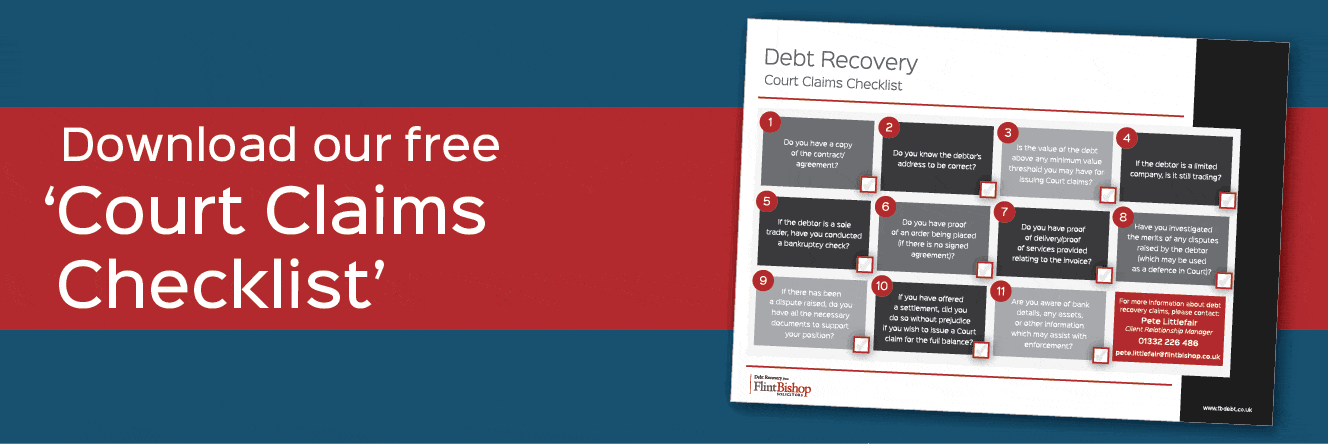It is incredibly rare to meet a credit manager who enjoys writing-off unpaid debts. For some, pride plays a factor in this decision and for others, it is a simple choice based on economics. This article looks at the various factors that will determine when to litigate and when to walk away, particularly for credit managers who manage the collection of volume debts.
Once internal credit control chasing has been exhausted, the threat of potential court action from a third party law firm is usually enough to encourage payment from most delinquent debtors. Where bad debts still remain unpaid following ‘pre-legal’ involvement from a law firm, the options are largely narrowed down to either issuing court proceedings or writing-off the debt.
This choice will involve different considerations for each company and usually on a case-by-case basis. The main factors will often be:
- The value of the debts versus the cost of court action
- Maintaining a reputation in the market that all unpaid debts will be actively pursued;
- The risk of any potential damage to customer relationships and/or negative brand PR.
High volume, low-value debts: does litigation play a part in the collection strategy?
For businesses that have a high volume of customers with a relatively low average invoice value, the cost-effectiveness of using litigation to recover bad debts becomes more challenging. However, this decision is not always one based purely on the economics.
In this visible age of social media, message boards and blogs, credit managers are conscious not to create a reputation of being a soft touch with non-payers. We have known some firms who will litigate on debts of £100 or even lower. For them, it is important to set a marker that every debt will be pursued in order to prevent the reoccurrence of serial non-payers. Companies should have a policy that works for their specific circumstances and debtor profile, but there is always room for case-by-case assessments rather than a blanket remit. Flexibility is important.
A common frustration of credit managers managing volume debts is that their legal partner will blindly ask them whether they would like to litigate or write-off debts following a ‘pre-legal’ collection process. A good legal recovery firm should provide you with an assessment of each case that has reached the end of its pre-legal recovery process where they believe that further court action is appropriate. This should be based on factors such as:
- The value of the debt + costs and interest applied
- Known assets/ability to pay
- Validation of a correct address
- Any known disputes
- Information gained during pre-legal debtor communications
At the end of the day, it will be the client’s choice whether to litigate, or not, but a good legal partner will have provided them with sufficient information in order to make a fully informed decision.
How economical is it to issue a claim?
For most companies, the reality is that cost will largely dictate when issuing court proceedings is a viable recovery tool. This is especially true with firms who operate with low margins and cash is very much king. However, there is always a danger that credit managers may be over cautious when setting a financial threshold to determine the point at which they will take a debtor to court, due to the costs involved.
For example, we regularly come across large firms who have a blanket policy not to litigate on any debts under £1,000 no matter what the circumstances, as they perceive this to be uneconomical. However, there are fixed costs that can be added to the debt at the point of issuing the claim, which will increase the total recoverable amount. Below is an example:
If you wish to recover a debt of £500 and are working with a law firm, you are entitled to add fixed legal costs to the sum. You will, therefore, be entitled to recover the following amount:
- Debt: £500
- Court issuing fee: £35
- Fixed costs added to the debt when issuing proceedings: £50
- Fixed costs added to the debt on Judgment: £22
- Total recoverable: £607
This will mean that you are entitled to recover a total of £607 for the £500 debt. On top of this, the late payment interest and compensation you may have already added will further increase the recoverable amount. It is likely that this will make your recovery at least cost neutral to you.
Whilst there will be reasons not to pursue claims under a certain threshold, particularly if the claim is likely to be defended, a quick assessment of each case can provide an insight into the most suitable claims to pursue and increase realisations as a result.
Negative PR and relationship issues
Many large firms will be conscious of their brand PR issues when deciding to litigate against overdue debtors. Others may want to avoid damaging certain client relationships, even though they are bad payers.
Where this is the case, the pre-legal recovery process can be very successful in flushing out those debtors who will pay once a solicitor becomes involved. The advantages of using a third party law firm go far beyond the initial power of a solicitor’s letterhead. A good third-party law firm will engage with your debtors, unravel any disputes and reach an agreeable settlement, without the need for court action wherever possible.
Even at this pre-legal stage, the client’s PR should always be an important consideration and acting in a professional manner throughout will help ensure that your company name is not listed on blogs for the wrong reasons.
Where any debts still remain unpaid following pre-legal tactics, it is crucial to ensure that you have addressed any disputes raised by the debtor before deciding to issue court proceeding. This is especially relevant when dealing in volume debts and there is an appetite to take collections to the next step, but there is a wariness of the potential consequences of doing so. The reality is if you are confident that your own house is in order, you will be able to successfully issue more claims than you perhaps first thought, without any negative PR considerations.
Conclusion: when to litigate and when to walk away?
The appropriate time to use litigation varies from firm to firm and there is a careful balance to strike considering all of the points previously mentioned.
Unfortunately, various reforms and rises in court costs have led to some credit managers being completely opposed to considering court action as a viable collections tool within their arsenal. However, this certainly is not the case and it is always feasible to work with your third-party law firm in creating criteria for cases where issuing court proceedings is not only viable but a highly recommended alternative than writing-off the debt
Having trust in your legal recovery partner to provide the right advice in full knowledge of your business objectives is key to success.
For more information, please contact us on 01332 226 474 or email: .


